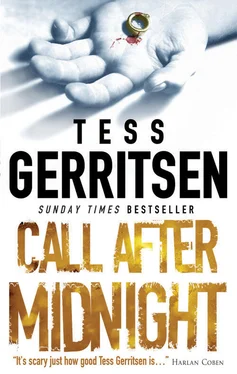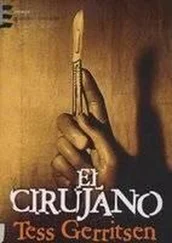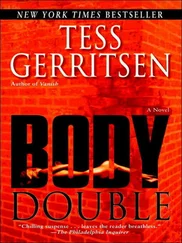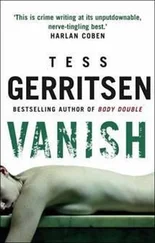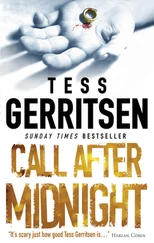He dragged the body onto the bed and tossed aside the three pillows that had been fluffed up beneath the covers. He estimated the body’s size to be six feet plus or minus an inch. The same height. Good. Dance exchanged clothes with the corpse; it was probably unnecessary, but he was a thorough man. Then he took off his wedding ring and tried to slip it onto the corpse’s finger, but it wouldn’t quite fit over the knuckle. He went to the bathroom, soaped the ring and finally managed to jam it on the dead man’s finger. Then he sat down and smoked a few cigarettes. He tried to think of any details he might have missed.
The three bullets, of course. Hunting around in the pillows and ticking, Dance managed to retrieve two of the bullets. The third was probably embedded somewhere in the mattress. Before he could probe any deeper, he heard footsteps in the hallway. Did the assassin have an accomplice? Dance swept up the gun, aimed at the door and waited. The footsteps moved on and faded down the corridor. A false alarm. Still, he should leave now; to stay any longer would be foolish.
From the dresser drawer, he pulled out a bottle of methanol. It would burn rapidly and leave no residue. He poured it over the body, the bed and the surrounding rug. The room contained no smoke alarms or automatic sprinklers—Dance had chosen the old hotel for just that reason. He set the ashtray beside the bed and gathered the dead man’s belongings, along with the empty methanol bottle, and put them in a trash bag. Then he set the bed on fire.
With a whoosh the flames took off, and in seconds the body was engulfed. Dance waited just long enough to be certain there’d be nothing recognizable left.
Carrying the trash bag, he left the room, locked the door and walked down the hall to the fire alarm. He didn’t see the point of killing innocent people, so he broke the glass and pulled the alarm lever. Then he took the stairs down to the ground floor.
From an alley across the street, he watched the flames shoot from his window. The hotel was evacuated, and the street filled with sleepy-eyed people wrapped in blankets. Three fire trucks responded within ten minutes. By that time his room was a blazing inferno.
It took an hour to extinguish the fire. A crowd of curious onlookers joined the shivering hotel guests, and Dance studied their faces, filing them away in his memory. If he saw any of them again, he would be warned.
Then, through the knot of people, he spotted a black limousine crawling slowly down the street. He recognized the man sitting in the back seat. So the CIA was here. Interesting.
He had seen enough. It was late, and he needed to be on his way, back to Amsterdam.
Three blocks away, he threw the trash bag with the empty methanol bottle into a dumpster. With that the last detail was taken care of. He’d done what he had come to Berlin to do. He’d killed off Geoffrey Fontaine. Now it was time to vanish. He walked off whistling into the darkness.
* * *
Amsterdam
THE OLD MAN was awakened at three in the morning with the news. “Geoffrey Fontaine is dead.”
“How?” asked the old man.
“A hotel fire. They say he was smoking in bed.”
“An accident? Impossible! Where is the body?”
“Berlin morgue. Very badly burned.”
Of course, thought the old man. He should have known the body would not be recognizable. Simon Dance, as usual, had done a superb job of covering his tracks. So they had lost him again.
But the old man still had one card to play. “You told me there was an American wife,” he said. “Where does she live?”
“Washington.”
“I will have her followed.”
“But why? I just told you the man’s dead.”
“He’s not dead. He’s alive. I’m sure of it. And this woman may know where he is. I want her watched.”
“I’ll have my men—”
“No. I will send my own man. Someone I can count on.”
There was a pause. “I will get you her address.”
After he’d hung up, the old man could not go back to sleep. For five years he’d waited. For five years he’d been searching. To have come so close, only to fail again! Now everything depended on what this woman in Washington knew.
He had to be patient and wait for her to betray herself. He would send Kronen, a man who’d never failed him. Kronen had his own methods to extract information— methods difficult to resist. But then, that was Kronen’s special talent. Persuasion.
Washington
IT WAS AFTER midnight when the telephone rang.
Through a heavy curtain of sleep, Sarah heard it ring. The sound seemed impossibly far away, as if it were a distant alarm going off in a room beyond her reach. She struggled to wake up, but she was trapped somewhere in a world between sleep and wakefulness. She had to answer the phone; she knew her husband, Geoffrey, was calling.
All evening she’d waited to hear Geoffrey’s voice. It was Wednesday night, and on his monthly trips to London, Geoffrey always called home on Wednesday. Tonight, however, she’d crawled into bed early, sniffling and coughing, a victim of the latest flu virus to hit Washington. It was influenza A-63 from Hong Kong, a particularly miserable strain that she now shared with half her colleagues in the microbiology lab. For an hour she’d sat up reading in bed, fighting valiantly to stay awake. But the combination of a cold capsule plus the most recent Journal of Microbiology had worked faster than any sleeping pill. Within minutes she’d fallen back on the pillows with her glasses still perched on her nose. It would be just a short rest, she had promised herself, just a catnap…. In the end, sleep had crept up and ambushed her.
She woke with a start to find that the bedside lamp was on, Journal of Microbiology still draped across her chest. The room was slightly out of focus. Pushing her glasses back in place, Sarah glanced at the clock on the nightstand. Twelve-thirty. The telephone was dead silent. Had she been dreaming?
She jumped as the phone rang again. Eagerly she grabbed the receiver.
“Mrs. Sarah Fontaine?” asked a man’s voice.
It wasn’t Geoffrey. Sudden alarm shot through her like a jolt of electricity. Something was terribly wrong. She sat up at once, fully awake. “Yes. Speaking,” she said.
“Mrs. Fontaine, this is Nicholas O’Hara, U.S. State Department. I’m sorry to call you at this hour, but…” He paused. It was the silence that terrified her most, for it was too deliberate, too practiced, a strategically placed buffer to ready her for a blow. “I’m afraid I have some bad news,” he finished.
Her throat tightened. She felt like shouting, Just tell me! Tell me what’s happened! But all she could manage was a whisper. “Yes. I’m listening.”
“It’s about your husband, Geoffrey,” he said. “There’s been an accident.”
This isn’t real, she thought, closing her eyes. If Geoffrey were hurt, I would have felt it. Somehow I would have known....
“It happened about six hours ago,” he continued. “There was a fire in your husband’s hotel.” Another pause. Then, with concern in his voice, he asked, “Mrs. Fontaine? Are you still there?”
“Yes. Please go on.”
The man cleared his throat. “I’m sorry to tell you this, Mrs. Fontaine. Your husband…he didn’t make it.”
He allowed her a moment of silence, a moment in which she struggled to contain her grief. It was a stupid, irrational act of pride that made her press her hand over her mouth to stifle the sob. This pain was too private to share with any stranger.
“Mrs. Fontaine?” he asked gently. “Are you all right?”
At last she managed to take a shaky breath. “Yes,” she whispered.
Читать дальше
